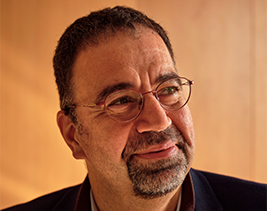Expert Voices
Artificial Intelligence - a blessing or a curse for sustainable development?

In recent years, the use of Artificial Intelligence (AI) has grown rapidly, affecting many industries and areas of human life. But should we view AI as a blessing or curse? How about its impact on social development and the global goals? We spoke with Professor Daron Acemoglu of the Department of Economics at the Massachusetts Institute of Technology, who shared his take.
A blessing or a curse? How do we ensure that AI is used for the greater good for people and planet?
“AI could be either a blessing or a curse. The future of AI remains unwritten, and it will depend on the choices we make in the current generation. There is no doubt that advances in generative AI tools, such as large language models, have been impressive. But these could be used for the greater good or for enriching a narrow elite, with all of the costs that this entails. To ensure we are on a socially beneficial path, we must start with a broader discussion, encompassing many more stakeholders than just the most powerful tech leaders, on what we can achieve with these new tools and what we want from them.
My view is that it is both technically feasible and highly socially desirable to have pro-worker and pro-citizen AI - meaning AI tools that increase worker expertise and contribution to the production process and empower workers and citizens. This is a critical first step because the current development path of the industry is centered on automation and control of information by a few large players. Moreover, I do not believe that we can escape this path unless voices from workers, civil society and the developing world are heard.”
What opportunities could AI bring towards advancing social development, reducing inequalities and protecting vulnerable groups? What are the pitfalls to look out for?
“The digital technologies so far have been a major source of inequality. My work with Pascual Restrepo estimates that between 50% and 70% of all between-group inequality increase in the United States since 1980 is accounted for by the use of these technologies for automation. The danger is that we will continue the same path with AI. If we pursue this path, we will get even more inequality, both between different types of workers in the labor market and between capital and labor.
It is possible to use AI tools to increase the expertise of different types of workers in tasks that range from production to office work and creative activities. It is also possible to use AI tools to enable better democratic participation and civil society activity. But these more hopeful possibilities require a major redirection of how we are using AI and how we are developing AI."
Can AI bring us closer to achieving the Sustainable Development Goals?
“This is one of the promises that boosters of AI make. I am not as optimistic on this. I see a path of how AI can be used for helping workers, as I explained in response to the previous two questions. But when it comes to central issues of sustainable development, such as combating extreme poverty in the developing world, fighting climate change, delivering better healthcare to billions of people around the world, and sustaining peace, the most important decisions are human decisions. AI could be a small help, but it would be misleading and counterproductive to think that technologies can by themselves solve these human problems.”
AI also raises some ethical concerns. What are the important ethical considerations and practical ways to deal with challenges when using AI?
“There are many ethical issues with AI. To me the most important one is that the current path of development is likely to disempower people as workers and citizens. We see this with the focus on automation; we see this with the way in which the gains from previous digital technologies are distributed (mostly to the already very rich); and worse of all, we see this in who controls information. AI is entangled with data and information. In my opinion, the biggest ethical problem arises when we allow the utilization of AI tools to monopolize information. This enables manipulation of both the economic landscape and politics according to their own agendas.”
***
A new UN Advisory Body on AI was launched by UN Secretary-General António Guterres on 26 October 2023. The new body gathers experts with deep experience across government, the private sector, technology, civil society, and academia, to support the UN in its efforts to ensure that AI is used for the greater good of humanity. Learn more from UN News here.
 Welcome to the United Nations
Welcome to the United Nations